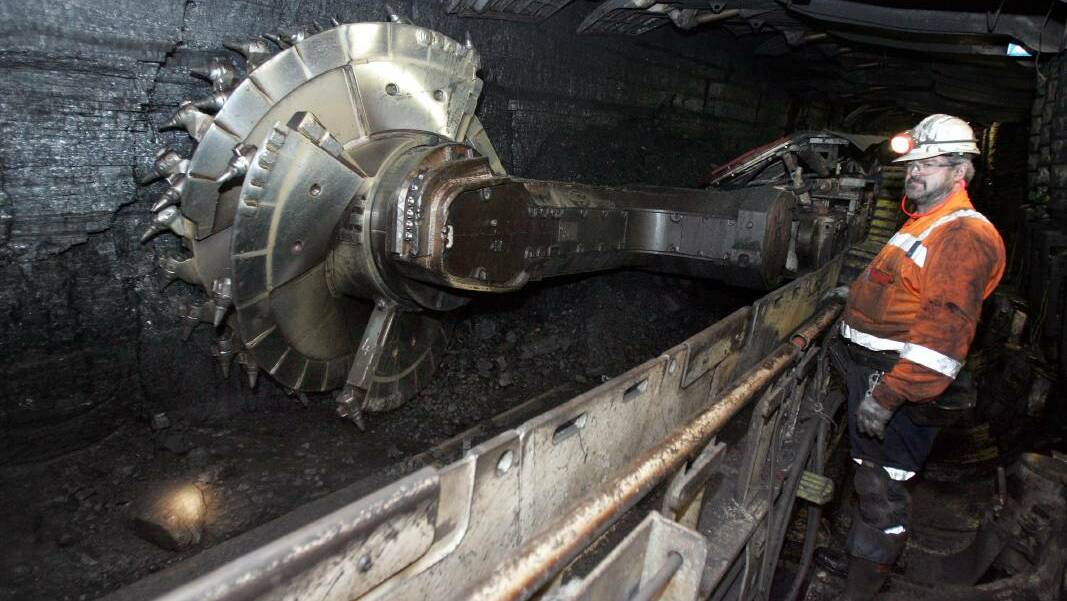
News last fortnight that Wollongong Coal was seeking to reopen its Wongawilli colliery was simply the latest in another year of tumult, and turmoil – but also significant triumphs – for the region’s most polarising industry.
As multiple significant coal projects have reached the climax of the planning process, both the mining lobby and anti-coal environmentalists – for different reasons – have said the industry is on the edge.
Environmentalists say fossil fuels have reached their use-by date and a future with less damaging energy sources has arrived.But neither of these extreme outcomes are the story of 2020. Remarkably, this year five Illawarra mines have come up for approval or extension at the time the industry’s very existence is being debated.

Environmentalists from the Protect Our Water Alliance protest against the loss of water outside South32’s office earlier this month.
The approval in March of Peabody’s expansion of its Metropolitan Colliery took some by surprise, particularly because longwall mining would be allowed beneath the Woronora reservoir.
A Peabody spokeswoman said the approvals would allow the mine “to continue to supply critical steel-making coal to the Port Kembla steelworks and to provide jobs for more than 400 local mining families during these unprecedented times”.
Two months later the workforce would be cut by about 150 people. Last week Peabody announced the miners would be stood down for two months from January 4, with the company blaming poor market conditions for its woes.
Supply contracts to BlueScope at Port Kembla had not been renewed, as the steelmaker sought to lock current prices into longer-term contracts. There is anger within the Metropolitan workforce that this vital relationship had soured.

Last week, after 11 years of trying, Wollongong Coal won approval to expand at Russell Vale. While its bord and pillar plans will reduce subsidence damage, there were significant questions about the Indian-owned outfit’s corporate governance and environmental compliance. In the end these weren’t determinative. The company has now turned its eyes to reopening at Wongawilli.
Simec wants to expand its Tahmoor mine, while perhaps the most significant project, South32’s Dendrobium extension, is before the Planning Assessment Commission. Its stakes are the highest, with 310m-wide longwalls risking significant damage to the water catchment above, but a rejection would lead to the mine’s closure and, South32 says, likely the closure of the Port Kembla steelworks.
In September the Commonwealth Industry department forecast Australia’s coal miners faced a $17 billion collapse in export earnings for the year. “At current prices, a significant proportion of Australian thermal coal production is loss-making,” its quarterly report said.
But the key word is “thermal”. While Swiss mining giant Glencore this week said it would soon close its Liddell and Integra mines in the Hunter, these mine brown coal which is mined for energy. Simply, finding a way to replace black coal in steelmaking is proving tougher than replacing brown coal for energy generation.
Do those same threats extend to the Illawarra’s coalfields? Judging by this year, to slightly misquote Mark Twain: rumours of the industry’s demise may have been exaggerated.

Illawarra mines undefeated in 2020
- Metropolitan extension approved
- Russell Vale expansion approved
- Dendrobium under assessment
- Tahmoor expansion in pipeline
- Wongawilli seeking to reopen
Wongawilli questioned
Wollongong Coal should be rehabilitating its Wongawilli mine rather than seeking to cut coal again, environmentalists say.
The miner has announced it is seeking to extend its mine at Wongawilli beyond its consent which expires this month. It says using the bord and pillar mining technique would minimise damage from subsidence at the surface.
But Protect Our Water Alliance spokeswoman Dr Rada Germanos questioned the need for the extension.
“As the markets for both thermal and metallurgical coal dry up and the coal price drops, it is time to talk mine rehabilitation,” Dr Germanos said.
“All over the world, coal mines are starting to close. We don’t want to see these companies pull out of the region and leave us to clean up the mess when the time comes. Our focus should be firmly on protecting our drinking water.
“Wollongong Coal Ltd has had 10 years to make Wongawilli Colliery a success, but they have failed time and again. [The] NSW government should take a stand to protect our drinking water and stop encouraging these coal mining projects that degrade our catchment.
“The proposed new drivage (underground roadway) will undermine Avon Reservoir. Mining occurred under Avon in the late 1970’s and early 1980’s and caused high inflows to the mine for many years.”


